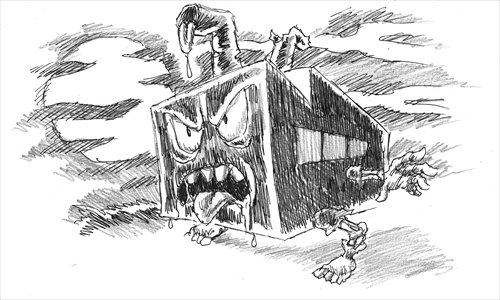HOME >> BUSINESS
Entrepreneurial spirit needs to adapt to modern era
By Cheng Hong Source:Global Times Published: 2016-3-3 0:13:01

Illustration: Peter C. Espina/GT
As China's traditional economic drivers, such as investment and exports, have been losing momentum, the country's economic slowdown since 2012 may not end in 2016.
Fortunately, China has identified the problems on the macro level. China's economy suffers from supply-side problems, and this will be addressed. But there are also problems at the micro level - among Chinese firms, in other words. So what are these problems?
My institute conducted field investigations in 2015 with over 580 enterprises in South China's Guangdong Province. Among them, many were having difficulty in making profits. Some were even "zombie enterprises" that somehow remained open despite continuously poor business performance.
However, under the same macroeconomic environment, other enterprises were achieving excellent performance, including those that were operating traditional businesses like electronics or clothing.
The root cause for the big difference in business performance in the same industry and economic environment is that some firms' old-fashioned business style is not as effective as it used to be, and they have failed to develop an entrepreneurial spirit that is in tune with the modern era.
In the early stages of China's opening-up, some people from the grassroots realized that the planned economy was holding their businesses back, so they made a lot of innovations by breaking through the existing bureaucratic rules and overcame many institutional barriers in order to embrace market-based practices. These early business leaders benefitted from a kind of "institutional dividend" and economists called them institutional entrepreneurs.
But as Nobel Prize-winning economist Douglass C. North explained in his theory of path dependence, the powerful influence of the past can affect decisions made in the present and future. In other words, development can be limited by decisions made in the past, even though circumstances are no longer the same. Since these early entrepreneurs chose to rely on institutional innovations, their subsequent behavior still follows the same path.
It was indeed true at the outset of China's opening-up that as long as entrepreneurs kept on pushing for more loosened institutional measures from the government, they could make more profits. Cooperation between entrepreneurs and government officials was generally constructive, because they broke the shackles of the planned economy and pushed China's economy toward a more market-based direction.
However, with reforms having progressed over the years, the market economy has now basically replaced the planned economy. And against this backdrop, it is more difficult to maintain profit growth if entrepreneurs still rely on cooperation with government officials. This is because institutional dividends are diminishing.
But our investigations showed that quite a number of entrepreneurs, especially those who were born in the 1950s and 1960s, still count on the government to help them out when they encounter operating difficulties. They hope the government can offer more stimulus, assistance or subsidies to pull them out of their plight.
The deeper we got into our investigation, the more worrying this phenomenon became. After all, what fundamentally determines the performance of a company? Economic research has shown that entrepreneurial spirit, as a creative-destructive force, is the most important driver of long-term economic growth, and this can be seen in four main aspects.
First, entrepreneurs seek new business opportunities through comprehensive innovation, such as technological advancement. Second, entrepreneurs try to improve efficiency by properly allocating resources. Third, they try to minimize business uncertainties by improving their own corporate governance. Lastly, they seek to raise productivity by offering incentives to employees.
All these elements are vital parts of the modern entrepreneurial spirit that is needed to drive continuous economic development.
Our research showed that a number of business leaders lack this kind of modern entrepreneurial spirit. Some enterprises simply produce knock-offs that have long product cycles, and some companies try to survive in the market by relying on low labor costs.
Some of them tend to blame the government for insufficient support instead of exploring new markets. Others fail to realize that greater investment in human capital could bring more profits.
Therefore, one of the problems causing the current economic slowdown is that entrepreneurial spirit in China is insufficient, especially among those born in the 1950s and 1960s. As the original entrepreneurial spirit has not adjusted to China's economic new normal, it is now one of the biggest concerns for the country's economic health and should be given close attention.
The author is director of the Wuhan University Institute of Quality Development Strategy. bizopinion@globaltimes.com.cn
Posted in: Expert assessment